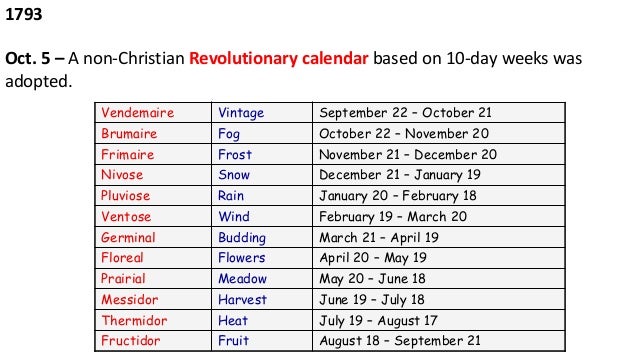
Some further points of resemblance between the two may be noticed. The French Revolution, though political, assumed the guise and tactics of a religious revolution. In their attempts to revolutionize all parts of society, the French revolutionists created a system of measurement that would stand the test of time and come to be the. A Revolutionary Change: The French Revolution and the Metric System The Metric system is one of the most lasting and least thought of impacts of the French Revolution.
From the 16th of Floral to the 3rd of Prairal in. For a glorious eighteen days, the Paris Commune resurrected the quixotic calendar of their revolutionary forebearers from a century before. The last time clocks were set and calendars hung according to the French Republican Calendar was some 147 years ago this month. Subsequent regimes added more ephemeral changes such as the revolutionary calendar and the cult of the Supreme Being.April 16, 2019.

Their politics of religion) are central themes. Instead of viewing the revolution as attempting to replace religion, we argue that religious communities recalibrated and France rechristianized in a revolutionary, religious process. The French Revolution was of “world-historical” importance for religion.The ways in which religion influenced the French Revolution and in which revolutionaries mobilized religion (i.e. The volume’s nine chapters explore the complicated, transnational history of the French Revolution, arguing against the traditional secular narrative, which sees 1789 as the opening up of the anti-religious modern world.
Duperron imagined not the abandonment of religion, but a universal spirituality capable of uniting Catholics and Hindus in a radical new faith.While Banks and Smith focus on the French imaginings of far-off religions, Erica Johnson and Kirsty Carpenter explore ways in which French émigrés used space to navigate the revolution. Duperron’s translations of the Upanishads reveal how orientalism could be mobilized to critique the revolution itself. Similarly, Blake Smith’s chapter on Anquetil Duperron considers the ways in which Frenchmen encountered Hinduism as a means to rethink the revolution’s relationship with religion. Revolutionaries imagined the Huguenot diaspora in ways that furthered their universalist claims and tested their relationship with the Catholic populace. Specifically, revolutionaries promised to return Huguenot ancestral lands (provided that they remained in the royal domaines), if they returned to France from the diaspora. Early in the revolution, many sought something like reparations for Huguenots upon their return.
What impact did the French Revolution have over the long term in the nineteenth and twentieth centuries? In many ways, Sarah A. For Carpenter, space meant separation, and that separation led to the weakening of émigré Catholicism, encouraging acculturation and eventually conversion.The second half of the book deals with the religious legacies of the Revolution in a myriad of ways. For Johnson, space gave these individuals new-found agency whereas those who remained in the metropole often found their orders and livelihoods ripped apart.

Dechristianization was a key feature of the revolution, but so too was rechristianization, or at the very least, a revolutionary recalibration of faith.Bryan A. The sum total is that the revolution’s legacy is far more complicated than the old secular narrative of modernity would allow. The chapters in the volume trace the imagined and real encounters that revolutionaries had with, or left for, the rest of the religious world. Drawing remarkable comparisons between the political and material cultures of the French and Turkish cases, Gungor ruminates on the creation of a secular state that constantly had to resacralize itself – such a problem, he argues, began during the French Revolution and continues to this day.Our volume asks a big question: Can thinking about religion during the French Revolution on a global scale offer any particular insight into a period often imagined to be the “crucible of the modern world?” The answer we came up with is yes. Hakan Gungor goes a little further afield to assess how the French Revolution served as a model for the Turkish War of Independence in 1919, and the subsequent creation of the Turkish state.
Her book Philanthropy and Race in the Haitian Revolution is under contract with Palgrave Macmillan. He tweets Johnson is Assistant Professor of History at Francis Marion University. He is currently completing a monograph on the role of Huguenots in the making of modern French political culture.
Sibree (New York: Dover, 1956), 285. Hegel, The Philosophy of History, trans. Alexis de Tocqueville , L’Ancien régime et la Révolution (Paris, 1856), 40.


 0 kommentar(er)
0 kommentar(er)
